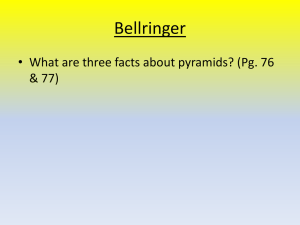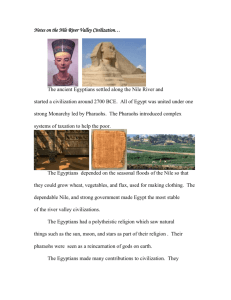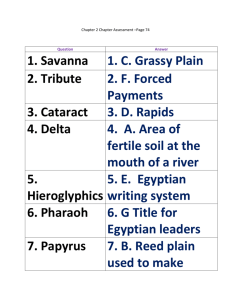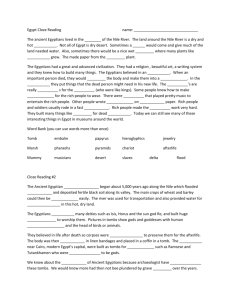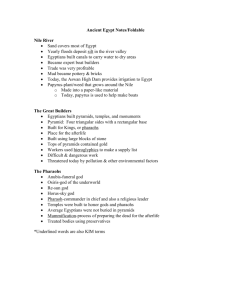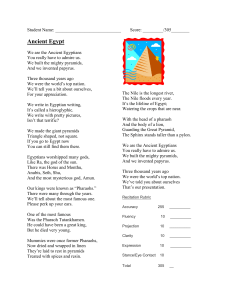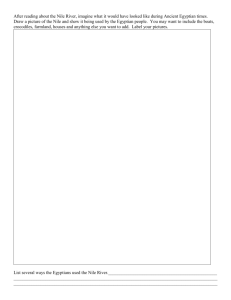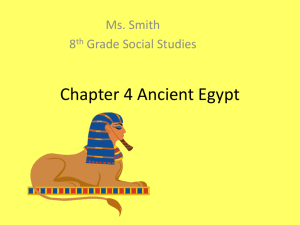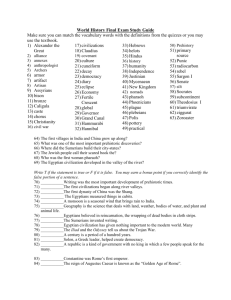ANCIENT CIVILIZATIONS
advertisement
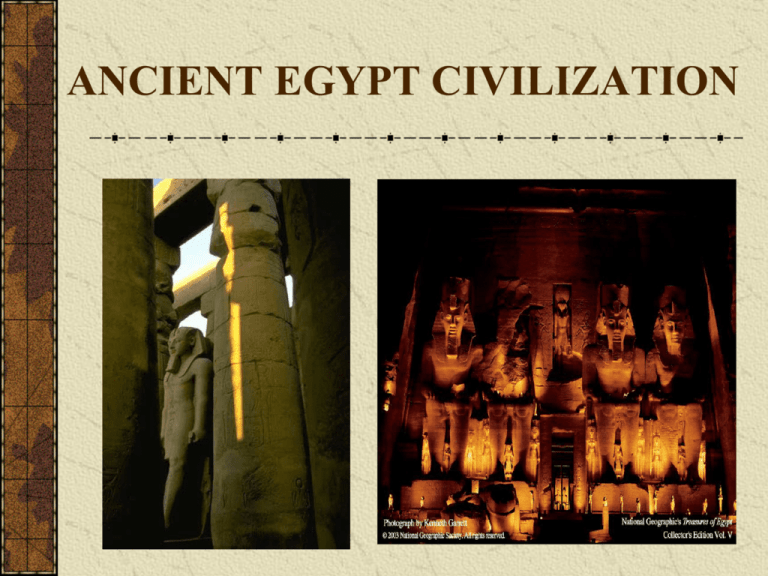
ANCIENT EGYPT CIVILIZATION The NILE RIVER, the longest river in the world (6,650 kilometers), flows north from the heart of Africa to the Mediterranean Sea. The Great Pyramid of Giza Pyramids These are the Giza pyramids, the most famous. Pyramids were tombs for the kings. These were built in 3500 B.C.E. The Great Sphinx is located on the Giza plateau, about six miles west of Cairo. Egyptian Pharaoh: Tutankhamun Egyptians were led by Pharaohs. They were priest-kings King Tut is the most famous Using computers, this image was reconstructed using his remains Tutankhamun Abu Simbel was built by Ramseses II ROYAL WOMEN: Royal mothers, wives, and daughters derived their status from their relationship with the king. Kings had MANY WIVES and royal families were large. The most prolific was Rameses II, who had eight wives and over a hundred children. Mummies Egyptians who could afford to do so would have themselves mummified. They believed in a better afterlife if their body was preserved. Mummies The Egyptians took out all of the internal organs, except the heart because it was believed to be the intelligence and emotion of the person. The Egyptians thought the brain had no significant value, so they took it out through the nose. The body was packed and covered with Natron (a salty drying agent). After this the body was left for 40-50 days. MATERIALS USED IN MUMMIFICATION: 1. 2. 3. 4. 5. Linen Sawdust Lichen Beeswax Resin 6. 7. 8. 9. 10. Natron Onion Nile mud Linen pads Frankincense Egyptians wrote in Hieroglyphics What did Egyptians write on? Ancient Egyptians used papyrus, a substance derived from the plant of the same name The EGYPTIAN LANGUAGE was one of the earliest languages to be written down, perhaps only the Sumerian language is older. First appearing on stone and pottery dating from 3100 B.C. to 3000 B.C., it remained in use for almost 3,000 years. The last inscription was written in A.D. 394. Daily Life Pharaohs and nobles participated in HUNTING, FISHING and FOWLING expeditions, a means of recreation that had ritualistic and religious significance. HUNTING SCENES often depicted on temple walls and tombs reinforce the prowess of kings and nobles. Rabbits, deer, gazelles, bulls, Oryx, antelopes, hippopotamuses, elephants and lions were among the wild animals hunted for their meat and skins. ROYAL PALACES, frequently CITIES IN THEMSELVES, included separate residences, a temple and a workers’ village. WOMEN engaged in WEAVING, PERFUME MAKING, BAKING and NEEDLEWORK. Very few artistic creations were signed, and exceptional ability was rewarded through increased social status. Women of all classes COULD EARN WAGES, OWN PROPERTY and EMPLOY WORKERS, but their main role was within the family. The title most women had was "MISTRESS OF THE HOUSE". They were considered EQUAL WITH MEN BEFORE THE LAW, and could sue for damages and divorce. Art and Literature From tombs and wall paintings we know they Egyptians were very talented artisans Wrote many folk tale stories of battle as well as poems and songs. They would share these with their Sumerian neighbors. ARCHITECTURE: The ancient Egyptians built their pyramids, tombs, temples and palaces out of stone, the most durable of all building materials. Apart from the pyramids, EGYPTIAN BUILDINGS were decorated with PAINTINGS, CARVED STONE IMAGES, HIEROGLYPHS, and THREE-DIMENSIONAL STATUES. The art tells the story of the pharaohs, the gods and the common people. GOVERNMENT & RELIGION The PHARAOH was the head of State and the divine representative of the gods on earth. RELIGION is the glue that binds local communities together and transforms them into nations. It creates common understandings and shared values that are essential to the growth of a civilization. Egyptian Economy Although Egypt looks really sophisticated, their traditional economy is based on farming and trade. Egyptians traded up and down the Nile, with Mesopotamians and sometimes with Indus Valley (in Pakistan) Sources Egyptian Civilization http://www.civilization.ca/civil/egypt/egcivile.html Ancient Egyptian Virtual Temple http://showcase.netins.net/web/ankh/ Greetings from Pakistan Compiled by: Students of Class V A & B Beaconhouse School System North Nazimabad Primary – IV Karachi - Pakistan
